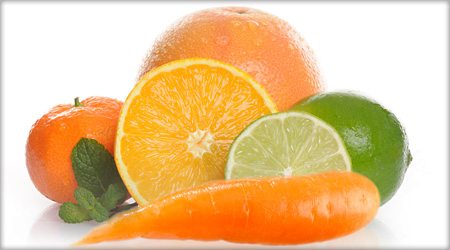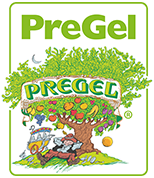

The immune system is an intricate and complicated system that defends the body from a wide variety of viruses, bacteria, toxins and other dangerous pathogens (“germs”). While the immune system is hard at work all day, every day, the tendency is to not pay it much attention until it fails – most commonly during the winter cold and flu season. To increase defenses and keep the system functioning at its peak, there are easy things you can do to boost your immune system. Keep in mind that “if you take care of your immune system, your immune system will in turn take care of you.”1
Antioxidants
Antioxidants are immune-boosting substances that serve to prevent bodily cell damage by stabilizing free radicals (unstable molecules). The most well-known antioxidant vitamins are C, E and beta-carotene (the body creates vitamin A from beta-carotene). An easy way to seek out these antioxidants is to pick brightly colored fruits and vegetables, and avoid over-cooking in order to preserve their nutrient content.
Vitamin C
Vitamin C is perhaps the most well-known among the immune- boosters, as it has long been shown to increase infection-fighting white blood cells and other antibodies that help keep viruses away from the body.2 Foods highest in natural vitamin C content include hot chili peppers, bell peppers, dark leafy greens, fresh herbs, broccoli and cauliflower, guava, kiwi, papaya, strawberries and citrus fruits.
Vitamin E
This important immune-booster stimulates the production of natural “killer cells” – the ones responsible for destroying germs and cancer cells.3 While vitamin E is found in many grains and seeds, it may be difficult to reach the recommended daily dose (which depends on age, health condition and lifestyle) without a vitamin supplement.
Beta-carotene
Beta-carotene is the most well-known of the larger carotenoid family, and is a powerful antioxidant that stimulates immune cells and increases the number of infection-fighting cells and “helper” T-cells. The body produces vitamin A from beta-carotene, which furthers the immune-boosting process. It is recommended to get beta-carotene from food sources, such as carrots and sweet potatoes, rather than taking it in supplement form (thereby allowing the body to only produce as much vitamin A as needed).4 Vitamin A is a crucial component for healthy skin, and the skin is considered the first line of defense against bacteria and other viruses.
Other than vitamins, immune-boosting antioxidants also come from other substances such as minerals – zinc is known to fight infection by increasing white blood cell production – and some fats such as Omega-3 fatty acids, which help protect the body from over reactions to infection.5
Diet
Boosting the immune system can be as easy as eating a daily balanced diet. Here are a few particular foods that help build defenses.
Fruits & Vegetables
Nearly all foods in this large category help your immune system by providing vital nutrients. Be sure to follow recommend daily servings of fruits and vegetables – keeping a colorful plate will help keep you healthy!
Yogurt
Packed with probiotics (“healthy bacteria”), yogurt helps to keep digestive and intestinal tracts running properly. Building the body’s familiarity with healthy bacteria helps defend it against exposure to unhealthy bacteria. A Swedish study involving 181 factory employees showcased that those who consumed a specific “good bacteria” (Lactobacillus reuteri) on a daily basis took 33 percent fewer sick days than those given a placebo.6 Look for yogurt labeled with “live and active cultures” to be sure it contains the immune boost needed.
Fish
Certain types of fish such as salmon, mackerel and herring provide a healthy dose of Omega-3 fats, which help reduce inflammation, thereby increasing airflow and protecting the lungs from respiratory infections.7 Also, the selenium found in shellfish helps white blood cells produce proteins that aid in combatting flu viruses.
Tea
A Harvard study found that people who drank five cups of black tea per day for a two-week timeframe had 10 times more virus-fighting interferon (proteins) in their blood than those who drank a placebo hot drink. L-theanine is the amino acid responsible for this immune boost, and it is found in high quantities in black and green teas.8
Mushrooms
Age-old folk remedies have long pointed out the health benefits of mushrooms. Modern research provides support for this in certain mushroom types which increase the production and activity of white blood cells (namely shiitake, maitake and reishi).9
Garlic
Garlic is an extremely potent immune-booster, as its sulfur compounds have been found to boost killer cell activity and increase antibody production, while its antioxidant properties help minimize free radicals in the bloodstream.10
Herbal Remedies
Various herbs and plants have stood the test of time in terms of their immune-building capabilities. When used as part of a balanced diet, herbal remedies can be a highly effective way to naturally protect the body from infection.
Echinacea
A plant native to the United States, echinacea is known as an “immunostimulant” because it stimulates the production of white blood cells and infection-fighting interferons.11 Echinacea has also been shown to prevent bacteria from entering body tissues, while also destroying certain viruses. When taken at the first sign of cold symptoms, echinacea can prevent an infection from worsening and may speed up recovery.
Ginseng
Ginseng is another helpful way to decrease the duration of cold and flu symptoms. Known to increase energy and reduce bodily stress, ginseng has recently also been suggested as an aid in clearing bacterial infections.
Elderberry
Used for its antioxidant activity and immune-boosting capabilities against viral and bacterial infections, elderberry juice was the remedy used to treat a flu epidemic in Panama in 1995.12 Elderberry can be found at health stores and several food markets.
Chamomile
Well-known for its mildly sedative effect, dried chamomile flower has been identified as having antibacterial and anti-allergenic properties.13 Used as a sleep aid and to lessen the symptoms of cold and stomach illness, chamomile is most commonly consumed as tea.
Activity & Lifestyle
Providing the body with the proper amounts of activity and rest is a crucial component in protecting and boosting the immune system. Regular exercise (30 minutes per day of moderate exercise) can increase white blood cell activity. A 2006 study involving 115 women showed that 30 minutes of moderate activity per day for one year resulted in a 50 percent reduction risk for colds over those who did not exercise.14 On the other hand, rest is also essential – eight hours of sleep per night is recommended to keep up bodily defenses.
Last, chronic stress has been shown to have a negative impact on immunity. According to a 2004 comprehensive review of nearly 300 individual studies, prolonged stress wears down the immune system, thereby increasing illness vulnerability.15
All of the above immune system boosters will help protect the body from illness without relying on antibiotics. Allowing the immune system to naturally increase its defenses against certain pathogens and micro-organisms puts your body in a better position to combat future exposures.16 That said, immune systems are not superhuman, so it is best to work with healthcare professionals to ensure a healthy and productive lifestyle.
References:
1,16 Immune System Boosters. 2011. Retrieved from Native Remedies: http://www.nativeremedies.com/ailment/immune-system-boosters-info.html [October 20, 2011].
2,3,4,5,10,11 Natural Immune Boosters. 2009. Retrieved from Wellness Trader: http://www.immune-boosters.com/herbal-remedies/immune-boosters/natural-immune-boosters [October 20, 2011].
6,7,8,9 MacMillan, A.; Schryver, T. (2011). 9 Power Foods That Boost Immunity. Retrieved from: http://online.prevention.com/flu_immunity/index.shtml [October 20, 2011].
12 Elderberry (Sambucus nigra). 2011. Retrieved from: http://www.herbwisdom.com/herb-elderberry.html [October 20, 2011].
13 Chamomile (Matricaria recutita). 2011. Retrieved from: http://www.herbwisdom.com/herb-chamomile.html [October 20, 2011].
14,15 Wong, C. (2009). Boost Your Immune System Naturally. Retrieved from About.com: http://altmedicine.about.com/od/healthconditionsdisease/a/immune_boost.htm [October 20, 2011].
Resources:
Top 10 Foods Highest in Vitamin C. 2011. Retrieved from: http://www.healthaliciousness.com/articles/vitamin-C.php 2011 [October 20, 2011].
Antioxidants and Your Immune System: Super Foods for Optimal Health. 2011. Retrieved from: http://www.webmd.com/diet/guide/antioxidants-your-immune-system-super-foods-optimal-health [October 20, 2011].
